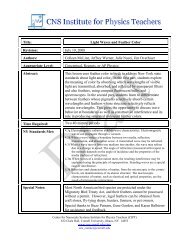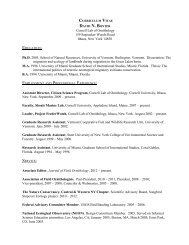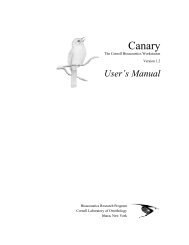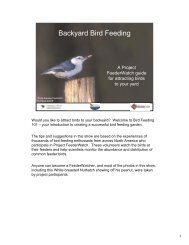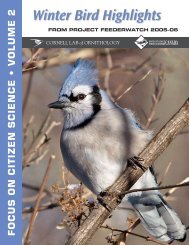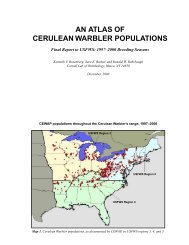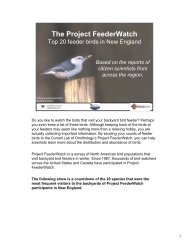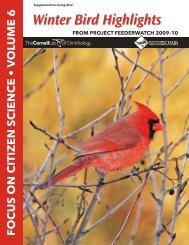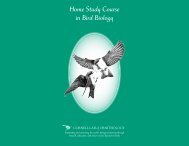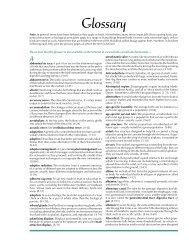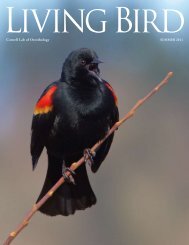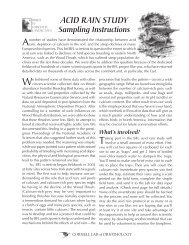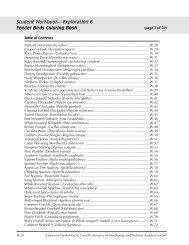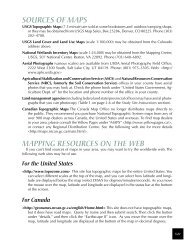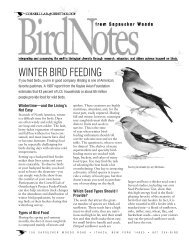Urban Bird Gardens Final Report - Cornell Lab of Ornithology ...
Urban Bird Gardens Final Report - Cornell Lab of Ornithology ...
Urban Bird Gardens Final Report - Cornell Lab of Ornithology ...
Create successful ePaper yourself
Turn your PDF publications into a flip-book with our unique Google optimized e-Paper software.
esources. Unclear roles, high turnover, and unfocused agendas were viewed<br />
negatively. No buy‐in and a lack <strong>of</strong> ownership were mentioned as contributing to<br />
failed<br />
partnerships. Competition and ‘too many cooks in the kitchen’ were also<br />
mentioned<br />
as negatives.<br />
Citizen science:<br />
All partners see benefits and show enthusiasm for participating in citizen science.<br />
Partners could see relevance for their youth and community and felt they could<br />
integrate<br />
projects within their programming. All partners felt that they could fit in<br />
citizen science with their organization’s focus.<br />
Chicanos por la Causa felt that citizen science would provide an exciting way to<br />
improve analytical skills and saw it closely tied with the creation <strong>of</strong> a community<br />
garden. Many partners felt that citizen science would be a long‐term project – and<br />
they viewed this positively. Some partners felt that participation would be fun and<br />
interesting. Many described citizen science as ‘hands‐on’ and active. Most partners<br />
felt that citizen science would bring the community together and promote parental<br />
engagement.<br />
One partner felt that they could use a citizen science project as a<br />
culmination<br />
<strong>of</strong> thematic learning.<br />
“I almost see it as a fun engaging way to organize parents and have them involved in a<br />
handson<br />
way in their kids’ educational and have them be supportive <strong>of</strong> that aspect”<br />
~ Los Angeles.<br />
“I think kids would really enjoy it…Citizen science exposes them to different things that<br />
they couldn’t have done”~ Houston<br />
Some barriers and challenges to participation in a citizen science project included<br />
lack <strong>of</strong> staffing, not having enough knowledge, and vandalism. Awareness <strong>of</strong><br />
community needs and realities were mentioned as important – making it important<br />
to<br />
make it relevant to the community. Single parents and heavy work schedules<br />
were mentioned as difficulties for parental participation.<br />
Support needed to participate in citizen science included resources and support<br />
(monetary, knowledge, materials, and technical). One partner mentioned that<br />
science can be seen as complex and can be intimidating and wondered if <strong>Cornell</strong><br />
could provide staff to ‘demystify’ the science process. Another partner spoke <strong>of</strong> how<br />
difficult it is to get parents involved in programming. Some partners expressed that<br />
it was very important that the project not be ‘too complicated’. If a project takes a<br />
great<br />
deal <strong>of</strong> staff time to interpret and is not engaging to the youth then it cannot be<br />
successful.<br />
Many<br />
partners felt that it would be critically important to make the program<br />
completely<br />
free to the community.<br />
<strong>Cornell</strong> <strong>Lab</strong> <strong>of</strong> <strong>Ornithology</strong><br />
<strong>Urban</strong> <strong>Bird</strong> <strong>Gardens</strong> <strong>Final</strong> <strong>Report</strong> Page 7



